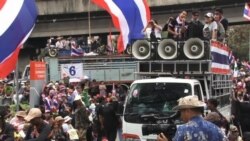CHIANG MAI —
As protests in Bangkok continue, the growing political polarization in Thailand is splitting families throughout the country. And there are growing fears the deepening political divide could lead to widespread violence.
Despite the carnival-like atmosphere of some anti-government protests in Bangkok, animosity between government supporters and opponents appears to be growing.
The underlying anger, fueled by public displays of hate mongering, has some observers worried that widespread violence could erupt within the country.
The conflict is attributed by some to a split between the "rural poor and elite urbanites," but some analysts say it is cutting much deeper into Thailand's social fabric.
Human Rights Watch senior researcher Sunnai Pasuk warned that a deep-rooted hatred was spreading through communities across the country.
“We see this division has entered into household families. A split. Rather siblings are split and friends do not talk to each other instead see each other as enemies who could no longer co-exist. This is a very radical development in the political confrontation in Thailand and, if allowed to continue, it is a very dangerous ingredient for large-scale communal conflict,” said Sunnai.
In the northern Thai village of Ban Mai, allegations of government corruption have created a rift within some families.
Farmer Duangian Kaewwanna switched political allegiance after the government failed to make payments on a controversial price-support program for rice farmers.
Now he's a loyal viewer of Blue Sky TV, a popular news network that broadcasts anti-government programming 24/7.
“The first time the government pledged for 15,000 baht per ton for the rice price but in the end they didn't keep their word. We haven't received any money from this program yet,” said the farmer.
Across the yard, his son-in-law, Surin Plukkam, remains a staunch government supporter.
But Surin admitted growing weary of the political conflict that has disrupted his family. He feared it could escalate into full-scale violence.
“We don't talk about politics with each other. If while we talk the subject comes up, we try to switch to something else. We talk a bit but if we think it'll lead to an argument, we just stop talking altogether,” he said.
For now, the power struggle within the country is more a war of words. But it's unclear whether the anger it is generating can be switched off, if things get worse.
Despite the carnival-like atmosphere of some anti-government protests in Bangkok, animosity between government supporters and opponents appears to be growing.
The underlying anger, fueled by public displays of hate mongering, has some observers worried that widespread violence could erupt within the country.
The conflict is attributed by some to a split between the "rural poor and elite urbanites," but some analysts say it is cutting much deeper into Thailand's social fabric.
Human Rights Watch senior researcher Sunnai Pasuk warned that a deep-rooted hatred was spreading through communities across the country.
“We see this division has entered into household families. A split. Rather siblings are split and friends do not talk to each other instead see each other as enemies who could no longer co-exist. This is a very radical development in the political confrontation in Thailand and, if allowed to continue, it is a very dangerous ingredient for large-scale communal conflict,” said Sunnai.
In the northern Thai village of Ban Mai, allegations of government corruption have created a rift within some families.
Farmer Duangian Kaewwanna switched political allegiance after the government failed to make payments on a controversial price-support program for rice farmers.
Now he's a loyal viewer of Blue Sky TV, a popular news network that broadcasts anti-government programming 24/7.
“The first time the government pledged for 15,000 baht per ton for the rice price but in the end they didn't keep their word. We haven't received any money from this program yet,” said the farmer.
Across the yard, his son-in-law, Surin Plukkam, remains a staunch government supporter.
But Surin admitted growing weary of the political conflict that has disrupted his family. He feared it could escalate into full-scale violence.
“We don't talk about politics with each other. If while we talk the subject comes up, we try to switch to something else. We talk a bit but if we think it'll lead to an argument, we just stop talking altogether,” he said.
For now, the power struggle within the country is more a war of words. But it's unclear whether the anger it is generating can be switched off, if things get worse.





